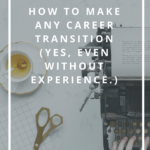Interview Lessons: What I Learned After Going on 55+ Interviews by Cultivitae
Each day when I open my web browser, I silently cringe because I know there will most likely be an article about the 10 things you must know before you interview or the 10 words or phrases that you must never say to a prospective employer. These junky articles with bad or misguided information seem to be the only voice that’s heard on this subject and that’s not only scary but downright wrong.
I don’t claim to be a master of the interview scene, but I was a Legal Temp for over seven years and that means I sat through more than my share of interviews. Sadly, there is no quick fix or short cut that can make you an interview superstar. With that said however, there are steps you can take to improve your interview process and to increase the chances that you will get more follow up interviews and offers.
The Interview is a Two-Way Street
The simple truth is that, at its heart, the interview is nothing more than a conversation between a prospective employee and an employer who needs to fill a vacant or newly created position. All too often the person being interviewed forgets that the interview process is meant to work both ways. The employer is evaluating you and trying to determine whether you are a good fit for the position, but at the same time you have the opportunity to evaluate the employer to see if they are a good fit for what you are looking for.
This is something that most advice articles I’ve read have forgotten. They are so focused on what thoughts or words that you can’t say or think that they never stop to realize that they have become part of the problem and not the solution. How can you be expected to be attentive or responsive to questions or make observations when you are constantly on your guard about saying or doing the wrong thing? These articles have set you up to fail because the moment you open your mouth or let your guard down all those forbidden thoughts and words will come pouring out.
Outlined below are 3 simple steps to follow if you want to make the best impression possible.
Step 1: Conduct Preliminary Research on Company + Interview Panel
When preparing for an interview, the first thing I like to do is to try to find the company’s or law firm’s website that I’m interviewing with. It’s worth your time to read through the ‘About Us’ section. This section not only gives you a brief history about the organization, but it will also give you a general idea of what the company or firm does. It will tell you how long the organization has been in business, what goods or services they offer or if it is a law firm, what areas of the law they focus on or practice.
If you have more time, you should also look through the ‘Meet the Team’ section. This section usually has photos and bios of key members of the organization. In my experience, the first round of interviews is generally conducted by support staff so you probably won’t learn about the person or people who are interviewing you, but you can find out about their managers or the CEO or Senior Partner. A lot of organizations will take you around to physically meet the team; this means that at some point in the interview you may find yourself in the office of one of those people you saw online.
In these situations, it would be good to know a few facts about them. For instance I once met an attorney who was a photographer before he went to law school. He saw that I had a Film and Media degree so a lot of my time with him was spent talking about “the industry.” It might not have been job related, but when the rest of the team asks him later what he thought of me, I had a good feeling that I had won him over.
Step 2: Relate What You Read Back to Your Skills + Experience
Looking at the organization’s site is only half of the work however, because you need to take that information and connect it back to the skills and experience you have listed in your resume. You usually don’t have time to cover your whole resume, but after reading through the website, there should be positions or skills listed in your resume that draw your attention because they are similar or a good fit for what the employer is looking for.
If you just graduated from college or are still in the early stages of your career, interviews can be difficult because you don’t have a lot of work experience to fall back on or talk about. This means that you will have to do a little more work in the preparation stage of your interview process. After reading through the organization’s website, you need to ask yourself a question, “Do I want this position?”
This may seem like a simple question, but it’s important. If you have no interest or passion about the position or the organization you are interviewing for, you won’t make it past the first round because the prospective employer will identify your lack of interest.
Step 3: Display Enthusiasm
You can show the prospective employer that you want this position because you are fired up about who the organization is and what they do. For the record, I’m not telling you that you should have the same energy as a high school prep rally, but you need to be able to demonstrate why you think you would be a good fit for the position. The best way to do this is to be prepared. The interview will probably start with a question like, “Tell us a little bit about yourself.”
Despite how simplistic this question appears, it can be one of the biggest stumbling blocks during an interview because applicants can easily get distracted or thrown off topic. You want the prospective employer to learn a few things about you, but you also need to remember to tie what you say back into their position or their organization. During your answer you can touch on what classes you have taken that are similar to what the organization does or what goals you have like learning about contracts or wanting to learn about working with an in house counsel. Show the employer that you have taken the time to do the research about their company and include questions that go beyond what do you do here? Or why did you choose this company?
Your research and inquisitive questions might not be enough to get the position, but they should make you stand out from the crowd and make you memorable. I once had an interview with Sony and, though I didn’t get the position, they called me up a few months later. They had another position open up and they remembered me from my interview because I made an impression on them. Relax and show them who you are and that you know what they are looking for.
Bonus Step: Breathe!
The last thing I’ll tell you may be the simplest piece of advice ever but for some reason when people get nervous it can be the hardest thing to remember, and that is to breathe. Take a few deep breaths before the employer enters the room and remember that it’s not a race. You don’t have to answer every question like someone is holding a stop watch recording your response times and don’t be shy to ask for water because nerves can often lead to having a dry mouth. Having water may also help because you can use it to slow yourself down or refocus your energy. Remember that the interview is simply a conversation, and as you gain more experience you’ll find you actually have the power to set the pace and tone of the interview.
I hope you found this article helpful and I wish you luck in whatever the future holds for you.
If you found this article helpful, you can learn about how Emily Liou, Career Happiness Coach at CultiVitae guides corporate professionals to wake up happy on Mondays! Emily works with ambitious corporate professionals in her private coaching program called The Corporate Ladder of Purpose™. She also teaches job seekers how to conquer every stage of the job search process through her comprehensive e-course and group coaching program, The Happily Hired Formula™.


